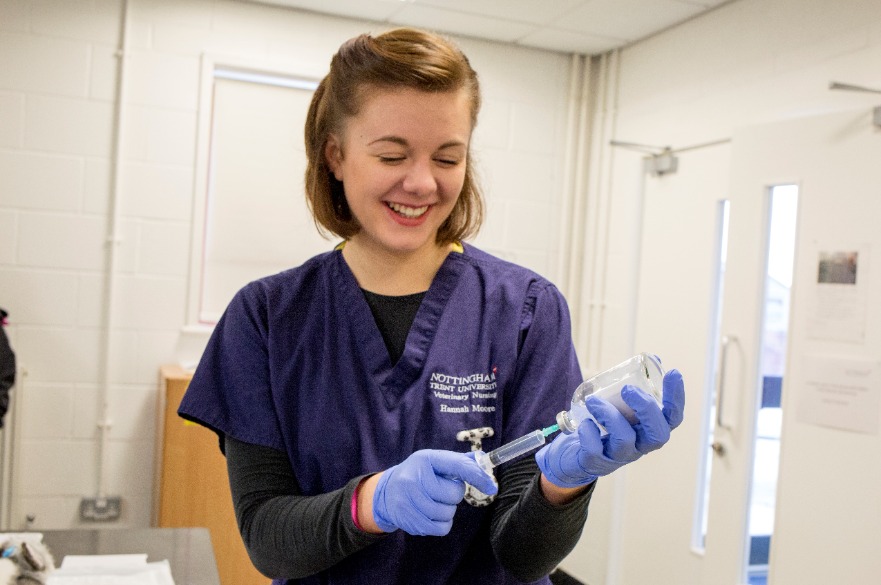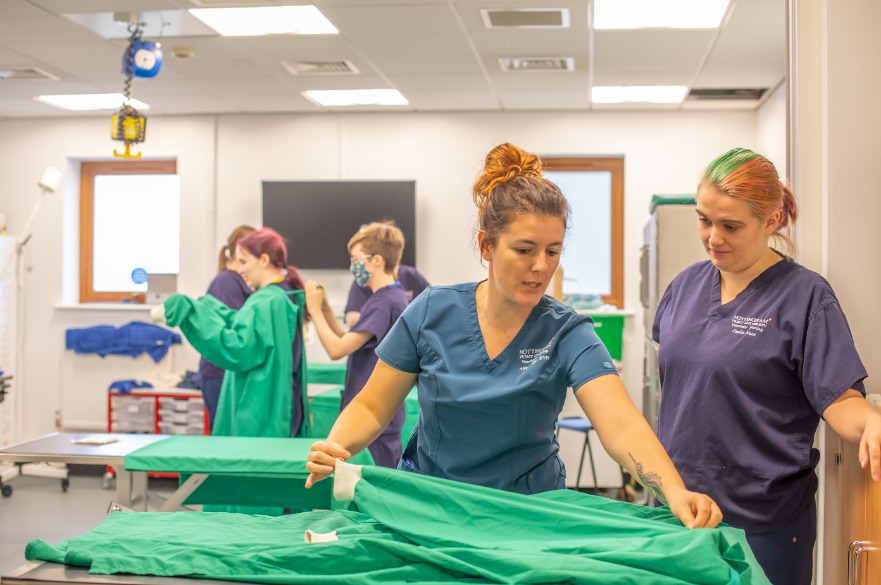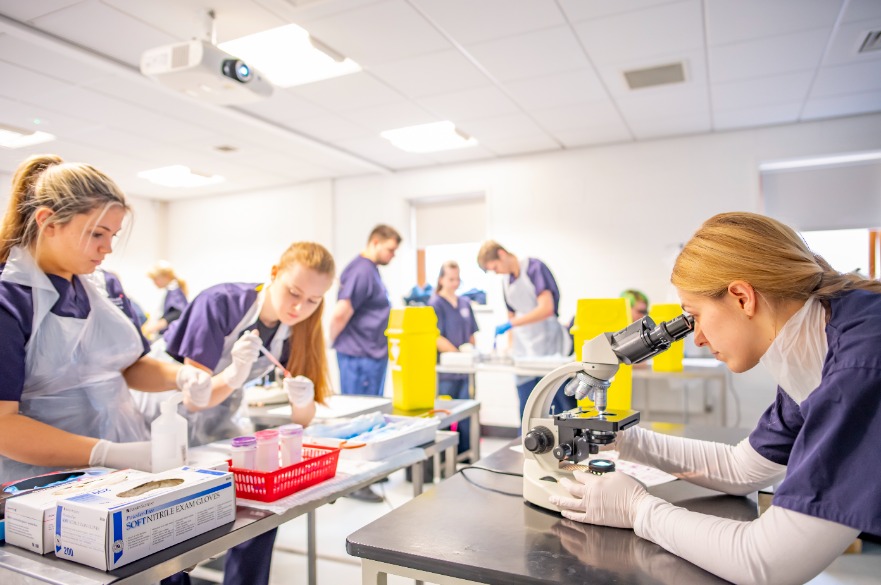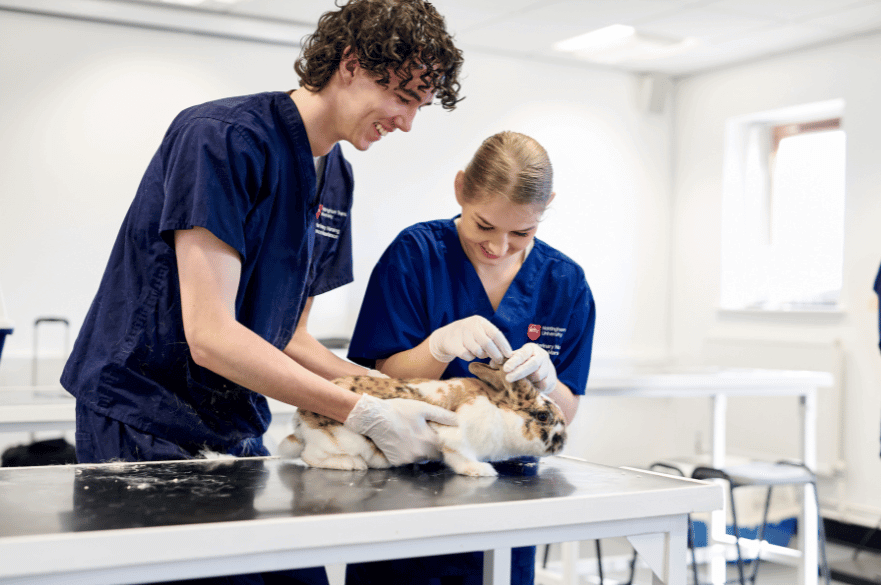Veterinary Nursing FdSc
- Level(s) of Study: Foundation degree / Undergraduate
- UCAS Code(s): D312
- Start Date(s): September 2023
- Duration: Three years full-time including a learning in the workplace year
- Study Mode(s): Full-time
- Campus: Brackenhurst Campus
-
Entry Requirements:
More information
Introduction:
This foundation degree combines a solid grounding in scientific theory with technical and practical learning. It is accredited by the Royal College of Veterinary Surgeons (RCVS), enabling successful graduates to register as fully qualified veterinary nurses. The course covers all elements of a veterinary nurse’s role, including the provision of skilled supportive care for sick animals; undertaking theatre work, laboratory diagnostic tests and radiography; assisting in consultation rooms; ordering medication; and ward work, including the general care and treatment of in-patients.
During your course you will have opportunities to attend several contact days, the Nottingham Trent University congress and also visit specialist veterinary practices. Your contact days will give you the opportunity to practice practical skills, attend lectures from professional experts and have one-to-one tutorials with your course tutors. Our Nottingham Trent University congress includes a variety of sessions from external veterinary practitioners.
-
The course integrates work experience in RCVS-approved veterinary training practices with teaching at the University. According to the National Student Survey 2023, 93% of FdSc Veterinary Nursing students are positive about the teaching on their course.
-
You'll undertake your clinical placements in two blocks, with the first one taking place in the summer between your first and second year of study. Your final year will then be spent completely in a veterinary practice.
-
You will be eligible to register with the RCVS as a Registered Veterinary Nurse (RVN) on graduation from the FdSc Veterinary Nursing course.
-
100% of our FdSc Veterinary Nursing graduates are in a 'high skilled' role 15 months after finishing their degrees (of those who entered employment, latest Graduate Outcomes Survey 2020/21).
What you’ll study
Don’t just take our word for it, hear from our students themselves
Our current students and recent graduates tell you all about their time at NTU and what they've gone on to do next.
Student Work
Video Gallery
Careers and employability
Your career development
After graduation, you are eligible to register with the Royal College of Veterinary Surgeons (RCVS) if you fulfil the requirements of both NTU and the RCVS. Our graduates gain employment in veterinary hospitals, practices or referral centres. In addition, you’ll be able to pursue a career in the allied veterinary industries. Opportunities exist in research and academia, pet food and medical supply companies, the pharmaceutical industry, and animal welfare organisations.
100% of our FdSc Veterinary Nursing graduates are in a 'high skilled' role 15 months after finishing their degrees
(of those who entered employment, latest Graduate Outcomes Survey 2020/21).
You can also progress on to the BSc (Hons) Veterinary Nursing Science (final year top-up) course.
Excellent placement opportunities
Learning in the workplace will take place throughout the course.
You'll spend a minimum of 1,800 hours (37.5 hours per week) in clinical placement, split across two blocks:
- 12 weeks between the start of June and the end of August between years one and two
- 37 weeks between July and April in the final year.
The clinical placements will be within approved training veterinary practices. These placements will facilitate your development of employment skills and provide you with the opportunity to apply your acquired skills and knowledge. In addition, you will achieve a greater depth of understanding and be able to develop your practical skills to enable you to achieve the RCVS Day One Competencies and Skills and complete the required Nursing Progress Log.
We will support you in finding placement through our network of affiliated veterinary practices. You may wish to return to practices closer to home and we endeavour to support you to ensure that the practices chosen are regulated to the same standards as our affiliated practices.
NTU Enterprise
You'll also have the opportunity to turn your ideas into a viable business with help from NTU Enterprise, NTU's purpose-built Centre for Entrepreneurship and Enterprise, a support centre to help students create, develop and grow their own businesses.
Campus and facilities
How to apply
Ready to join us? Then apply as soon as you can. Just click the Apply button at the top of the page and follow the instructions for applying. Make sure you check the entry requirements above carefully before you do.
Writing your application and personal statement
Be honest, thorough and persuasive in your application. Remember, we can only make a decision based on what you tell us. So include all of your qualifications and grades, including resits or predicted grades.
Your personal statement is a really important part of your application. It’s your chance to convince us why we should offer you a place! You’ve got 4,000 characters to impress us. Make sure you use them to show how your skills and qualities are relevant to the course(s) you’re applying for. For more hints and tips, take a look at our page on how to write a good personal statement.
You will need to add details of the required work experience in your personal statement.
Keeping up-to-date
After you’ve applied, we’ll be sending you important emails throughout the application process so check your emails regularly, including your junk mail folder.
You can get more information and advice about applying to NTU on our Your Application page. Good luck with your application!
Getting in touch
If you need any more help or information, please email our Admissions Team or call on +44 (0)115 848 4200.
You can apply for this course through UCAS. If you are not applying to any other UK universities, you can apply directly to us on our NTU applicant portal.
Please note this course is not open to students requiring a Tier 4 / Student Route visa.
Application advice
Apply early so that you have enough time to prepare – processing times for Student visas can vary, for example. After you've applied, we'll be sending you important emails throughout the application process – so check your emails regularly, including your junk mail folder.
Writing your personal statement
Be honest, thorough, and persuasive – we can only make a decision about your application based on what you tell us:
Advice on writing a good personal statement
Would you like some advice on your study plans?
Our international teams are highly experienced in answering queries from students all over the world. We also have members of staff based in Vietnam, China, India and Nigeria and work with a worldwide network of education counsellors.
- Complete this simple form to keep in touch with the International Office.
The University's commitment to delivering the educational services advertised.




